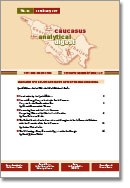No. 93: Political Islam

Author(s): Jean-François Ratelle, Michael Hikari Cecire, Arzu Geybulla
Editor(s): Michael Cecire (Special Editor), Lili Di Puppo, Iris Kempe, Matthias Neumann, Jeronim Perović, Heiko Pleines, Zurabishvili, Tinatin
Series: Caucasus Analytical Digest (CAD)
Issue: 93
Publisher(s): Caucasus Research Resource Centers; Research Centre for East European Studies at the University of Bremen; Center for Security Studies (CSS) at ETH Zurich; German Association for East European Studies (DGO)
Publication Year: 2017
